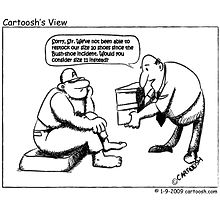- Insult
-
For the 1932 film, see Insult (film).
An insult (also called a slur, scoff, slight or putdown) is an expression, statement (or sometimes behavior) which is considered degrading and offensive. Insults (sometimes called "cracks" "remarks" or one-liners)[1] may be intentional or accidental. An example of the latter is a well-intended simple explanation, which in fact is superfluous, but is given due to underestimating the intelligence or knowledge of the other.
Contents
Exchange
Lacan considered insults a primary form of social interaction, central to the imaginary order - 'a situation that is symbolised in the "Yah-boo, so are you" of the transitivist quarrel, the original form of aggressive communication'.[2]
Erving Goffman points out that every 'crack or remark set up the possibility of a counter-riposte, topper, or squelch, that is, a comeback'[3] He cites the example of possible interchanges at a dance in a school gym:
- 'A one-liner: Boy: "Care to dance?" Girl: "No, I came here to play basketball" Boy: "Crumbles"
- A comeback: Boy: "Care to dance?" Girl: "No, I came here to play basketball" Boy: "Sorry, I should have guessed by the way you're dressed"'.[4]
Sexual
'Verbal insults often take a phallic form. Almost all the really vicious swearwords we can use to hurl abuse at someone are sexual words...Visual insults follow the same trend'.[5]
Junior school often sees boys 'use sexual swear words and symbolic sexual gestures to unsettle and overtly intimidate girls'.[6]
Formal
The flyting was a formalized sequence of literary insults: 'invective or flyting, the literary equivalent of the spell-binding curse, uses similar incantatory devices for opposite reasons, as in Dunbar's Flyting with Kennedy '.[7]
'A little-known survival of the ancient "flytings," or contests-in-insults of the Anglo-Scottish bards, is the type of xenophobic humor once known as "water wit" in which passengers in small boats crossing the Thames...would insult each other grossly, in all the untouchable safety of being able to get away fast'.[8]
Samuel Johnson once triumphed in such an exchange: 'a fellow having attacked him with some coarse raillery, Johnson answered him thus, "Sir, your wife, under pretence of keeping a bawdy-house, is a receiver of stolen goods"'.[9]
Anatomies
Various typologies of insults have been proposed over the years. Desmond Morris, noting that 'almost any action can operate as an Insult Signal if it is performed out of its appropriate context - at the wrong time or in the wrong place' - classes such signals in ten 'basic categories: 1. Disinterest Signals...2. Boredom Signals...3. Impatience Signals...4. Superiority Signals...5. Deformed-compliment Signals...6. Mock-discomfort Signals...7. Rejection Signals....8. Mockery Signals...9. Symbolic Insults...10. Dirt Signals'.[10]
Elizabethans took great interest in such analyses, distinguishing out, for example, the 'fleering frump...when we give a mock with a scornful countenance as in some smiling sort looking aside or by drawing the lip awry, or shrinking up the nose'.[11] Shakespeare himself set up an insult-hierarchy of seven-fold 'degrees. The first, the Retort Courteous; the second, the Quip Modest; the third, the Reply Churlish; the fourth, the Reproof Valiant; the fifth, the Countercheck Quarrelsome; the sixth, the Lie with Circumstance; the seventh, the Lie Direct'.[12]
Legal
Whether or not speech or behavior is insulting in practice, and sometimes by the terms of local assault statutes, is often a product of the subjective sense of the insulted party. However, insults to one person who might not mind such derogatory speech may indirectly insult others. Many states and local municipalities enforce prohibitions against rude, offensive or insulting speech, leaving citizens, law enforcement officers and courts to decide what is and what is not an insult. The concept of fighting words as a form of prohibited speech has developed in the jurisprudence of U.S. constitutional law concerning terms of disparagement. However, the fighting words exclusion is construed in an extraordinarily narrow manner, and only the type of insulting speech which is deemed "meaningless" can be suppressed. Speech containing significant literary, artistic, political, or scientific significance cannot be suppressed (a test known to attorneys and law students by the mnemonic device "slaps"), even if it is wantonly and maliciously insulting, demeaning, or even inciting of racial, ethnic, religious or sexual hatred.
Medical
The role of insults in the social sense may be better understood by an appreciation of how the term is used in a medical setting. Though a popular idiom refers to "adding insult to injury", in a medical context, they are one and the same: physicians examine injuries resulting from an insult to flesh and bones, caused by various traumatic events. In speech and in social settings, insults are words which tend to injure or damage the psyche. In humor, insults may be exchanged in much the same way as fighters exchange blows in training, to develop a resistance to the pain of mild injuries, or to spar with no real intention of causing any serious injury.
Perceptions of insults
Sociologists suggest that insults are often an indicator of flawed reasoning about the character or motivation of others. Though insults are common, and often used in jest, a fundamental axiom of sociology recognizes that derogatory forms of speech make erroneous attributions about the motivation of a person. Scholars classify the erroneous assumptions as the fundamental attribution error.
Situations also exist in which a person erroneously believes he or she has been insulted. For example, terms such as "Asian", "incorrect", "drunk", or "full-cheeked" are often interpreted as derogatory, when in fact they may be neutral descriptive terms or factual statements, which, at worst, would be simply inaccurate or incorrect rather than insulting. This phenomenon often occurs in individuals who suffer self-victimization or hypersensitivity.
What qualifies as an insult is also determined both by the indiviual social situation and by changing social mores. Thus on the one hand the insulting 'obscene invitations of a man to a strange girl can be the spicy endearments of a husband to his wife';[13] on the other hand, the male gaze may be insulting in and of itself to a feminist, whereas a post-feminist might note more discriminatingly how 'his eyes took me in...[but] at least he didn't look at me offensively; and believe me, if you're a woman who works in a bar, you can tell the difference between an evaluation and an eye fuck'.[14]
References
- ^ Erving Goffman, Relations in Public (Penguin 1972) p. 214
- ^ Jacques Lacan, Écrits: A Selection (1997) p. 138
- ^ Goffman, p. 215-6
- ^ Mad, quoted in Goffman, p. 216
- ^ Desmond Morris, The Naked Ape Trilogy (London 1994) p. 241
- ^ Emma Renold, Girls, Boys, and Junior Sexualities (2005) p. 130
- ^ Northrop Frye, Anatomy of Criticism (Princeton 1973 )p. 270
- ^ G. Legman, Rationale of the Dirty Joke Vol I (1973) p. 177
- ^ James Boswell, The Life of Boswell (Penguin 1984) p. 269
- ^ Desmond Morris, Manwatching (London 1987) p. 186-192
- ^ George Puttenham in Boris Ford ed., The Age of Shakespeare (1973) p. 72=3
- ^ Peter Alexander ed., William Shakespeare: The Complete Works (London 1962) p. 282
- ^ Erving Goffman, Relations in Public (1972) p. 412
- ^ Charlaine Harris, Dead as a Doornail (London 2009) p. 26
Literature
- Thomas Conley: Toward a rhetoric of insult. University of Chicago Press, 2010, ISBN 0-226-11478-3.
- Croom, Adam M. "Slurs." Language Sciences, Volume 33, Number 3, May 2011, pp. 343-358. Published by Elsevier.
See also
- Ad hominem
- Cyber defamation law
- Defamation
- Jibe
- Maledicta
- Rudeness
- Shoeing
- Taunt
- The dozens, a game of "one-upmanship" involving insults or snaps usually related to the mother of one's opponent
Abuse Types Anti-social behaviour · Bullying · Child abuse (neglect, sexual) · Domestic abuse · Elder abuse · Harassment · Humiliation · Incivility · Institutional abuse · Intimidation · Neglect · Personal abuse · Professional abuse · Psychological abuse · Physical abuse · Sexual abuse · Spiritual abuse · Stalking · Structural abuse · Verbal abuse · more...
Related topics Complex post-traumatic stress disorder · Dehumanization · Denial · Destabilisation · Exaggeration · Grooming (adult, child) · Lying · Manipulation · Minimisation · Personality disorders · Psychological projection · Psychological trauma · Psychopathy · Rationalization · Victim blaming · Victim playing · Victimisation
Emotions (list) Emotions Adoration · Affection · Agony · Awe · Amusement · Anger · Anguish · Annoyance · Anxiety · Arousal · Attraction · Caring · Compassion · Contempt · Contentment · Defeat · Dejection · Depression · Desire · Despair · Disappointment · Disgust · Ecstasy · Embarrassment · Empathy · Enthrallment · Enthusiasm · Envy · Euphoria · Excitement · Fear · Frustration · Grief · Guilt · Happiness · Hatred · Homesickness · Hope · Horror · Hostility · Humiliation · Hysteria · Infatuation · Insecurity · Insult · Irritation · Isolation · Jealousy · Loneliness · Longing · Love · Lust · Melancholy · Neglect · Optimism · Panic · Passion · Pity · Pleasure · Pride · Rage · Regret · Rejection · Remorse · Resentment · Sadness · Sentimentality · Shame · Shock · Sorrow · Spite · Suffering · Surprise · Sympathy · Tenseness · Thrill · Revenge · Worry · Zeal · Zest

Worldviews Compatibilism · Existentialism · Fatalism · Incompatibilism · Metaphysics · Nihilism · Optimism · Pessimism · Reclusion · Social justice · WeltschmerzSource: Parrott, W. (2001), Emotions in Social Psychology, Psychology Press, Philadelphia.
Wikimedia Foundation. 2010.


